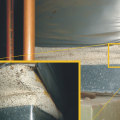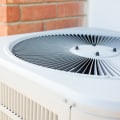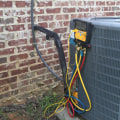5 Factors of Faultless 20x30x4 HVAC Furnace Air Filters To Take Note Of Before Seeking Air Conditioning Replacement
Are you in the market for 20x30x4 HVAC furnace air filters? Here are some factors to remember. First off, understand their role in combating pollutants. Size is another key aspect; no one likes unfiltered air slipping through. Next, consider energy efficiency. Trust us, your pocketbook will notice the difference! Now, don't forget about durability. Regular maintenance isn't just for teeth, you know. Think about using quality materials like pleated fabric.
Key Takeaways
- Start by checking the size of your chosen filter (20x30x4) for optimal filtration and minimal unfiltered airflow.
- Next, examine the MERV rating of your filter and its effect on energy consumption within your HVAC system.
- Filter durability is a necessary factor, including the material's quality and maintenance needs, to maximize the filter's lifespan.
- High-quality, robust materials compatible with your HVAC system should be prioritized when selecting a filter.
- Finally, remember to select a filter material thickness that aligns with your requirements; pleated fabric tends to deliver superior performance.
Understanding HVAC Furnace Air Filters
In any system, these parts of your equipment are helpful, yet often overlooked, components. They maintain indoor air quality while optimizing system performance by acting as the primary defense against airborne contaminants. Such substances can affect both the system's efficiency and the well-being of building occupants.
It's important to know their ratings to ensure your equipment's effectiveness. Minimum Efficiency Reporting Value is one such rating that informs about its particle trapping capability. Those with high scores are more efficient.
Proper maintenance can significantly improve the service life of your equipment. Regular cleaning and timely replacement prevent the accumulation of harmful substances that could lead to equipment malfunctions. Remember, even the most efficient ones can clog over time, reducing their effectiveness and leading to higher energy costs.
Importance of Correct Filter Size
In maintaining efficiency and performance of your equipment, choosing the right size is necessary. Its dimensions greatly impact its functionality. Those too small fail to cover the entire intake, allowing unfiltered air to infiltrate your system. On the other hand, oversized filters may not fit properly, possibly leading to air gaps which also permit unfiltered air to seep through.
Installation of a correctly sized filter guarantees thorough cleaning of all air circulating through your system. By doing so, not only does air quality improve in your living or working space due to the removal of different airborne particles, but it also prolongs your HVAC system's lifespan by preventing particle build-up on inner components.
Therefore, it is helpful to be accurate when choosing a new filter. Even a difference of a fraction of an inch can significantly alter your HVAC system's effectiveness. Before buying a replacement, always ensure to double-check your existing filter's size. Keep in mind, that filters that fit well contribute to your HVAC system's longevity, as well as enhance indoor air quality.
Evaluating Air Filter Efficiency
Filter size does matter, but evaluating your 20x30x4 HVAC air filter's effectiveness takes center stage. It's not just about how many airborne particles the filter traps; its impact on system performance matters as well. Therefore, testing filter effectiveness, analyzing airflow restrictions, and considering energy efficiency are necessary.
1. Testing Filter Effectiveness: This process measures the filter's ability to capture particles in passing air. Filters catching a greater percentage of particles are deemed more effective.
2. Analyzing Airflow Restriction: This involves examining the extent to which a filter hampers the flow of air in your HVAC system. High-quality filters strike a balance—trapping pollutants without considerably inhibiting airflow.
3. Considering Energy Efficiency: HVAC systems may consume more energy if their filters aren't effective, leading to higher power bills. Effective filters, however, reduce energy use.
Hence, before choosing an air filter, ensure you have evaluated these aspects. Optimal air quality comes from a filter that excels in all three areas—without overburdening your HVAC system or your budget.
Durability and Lifespan Considerations
Focusing on durability and lifespan considerations, one must know that a 20x30x4 HVAC air filter's longevity hinges heavily on the quality of materials used and the conditions of operation. Lifespan directly relates to how well the filter is maintained and how frequently it is replaced. Timely maintenance significantly extends the filter's life, ensuring peak efficiency of the HVAC system.
From a cost-efficiency perspective, filters with better durability might appear costly initially but provide extended service. This reduces the need for frequent replacements, translating to cost savings in the long run. In contrast, less expensive filters may require more frequent replacements, leading to higher overall costs.
Evaluating a filter's effectiveness is critical. Durable filters excel at capturing airborne particles throughout their service life, ensuring cleaner air circulation from the HVAC system. However, this effectiveness can decline over time, emphasizing the need for regular air filter maintenance.
Selecting the Right Filter Material
Optimizing HVAC performance rests on selecting appropriate filter material. Material choice helps enhance filter efficiency to capture particles, thereby improving air quality.
1. Consider Filter Thickness: Directly linked to trapping effectiveness, filter thickness matters. For instance, filters measuring 20x30x4 provide ample surface area for capturing particles, consequently improving air quality. Nevertheless, maintaining airflow should not be compromised by thickness, necessitating astute balancing of efficiency with performance.
2. Ensure Filter Compatibility: Filters show variation in compatibility across different HVAC models. Matching filter material with specific HVAC models ensures seamless integration into your system, preventing any potential air bypass.
3. Check Material Quality: Selecting robust, durable, yet flexible filter material contributes to enhanced particle trapping efficiency. Superior performance can be achieved by opting for high-quality materials such as pleated fabric or electrostatically charged media, rather than standard fiberglass filters.
Frequently Asked Questions
How Often Should I Replace My 20x30x4 HVAC Furnace Air Filter?
Every 60-90 days, consider swapping out your 20x30x4 HVAC furnace air filter. This practice depends, of course, on usage. Keeping up with regular filter changes can enhance efficiency, potentially leading to savings in energy expenses.
What Are the Signs of a Faulty Air Filter in an HVAC System?
Decreased air flow, unexplained respiratory problems, and rising energy usage hint at faulty HVAC air filters. Spotting such issues early on can help avoid damage, mitigating potential costs associated with replacements. Regular maintenance also helps for optimal system performance.
Can I Clean and Reuse My 20x30x4 HVAC Furnace Air Filter?
Yes, you can reuse certain 20x30x4 HVAC furnace air filters. Over time, though, their performance might diminish. How to clean them differs, but consistent upkeep helps avoid the high costs of replacements and ensure optimal functionality.
Does a Higher-Priced 20x30x4 HVAC Furnace Air Filter Guarantee Better Performance?
Pricier 20x30x4 HVAC furnace air filters don't automatically offer superior performance. During purchase decisions, potential buyers should factor in aspects such as customer feedback, brand credibility, and comparative performance analysis. A thorough cost evaluation is also advisable.
Will the Wrong Filter Size Affect My HVAC Systems Energy Efficiency?
Yes, HVAC systems can experience decreased efficiency due to incorrect filter size. Such mismatch can lead to elevated energy use, undermining system performance, resulting in increased energy expenses. Filter compatibility remains paramount for maintaining efficiency.
Learn more about HVAC Care from one of our HVAC solutions branches…
Filterbuy HVAC Solutions - Miami FL - Air Conditioning Service
1300 S Miami Ave Apt 4806 Miami FL 33130
(305) 306-5027
https://maps.app.goo.gl/Ci1vrL596LhvXKU79


